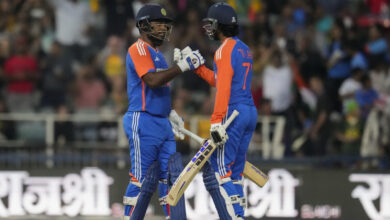Luis Rubiales kiss scandal not a wake-up call, but a punch in the face of governing bodies | Football News

So you know how it would all end. The accused, acquitted and painted innocent, delivering a moving speech on victimhood and mental trauma, touching upon the ordeal his family faces, the world sympathizing with him and haunting the alleged victim. The suspended—not banned or dismissed—chief of Spanish Football Luis Rubiales has been through this once. Three years ago, Yasmina Eid-Macche, an architect who renovated his house, accused him of assault and non-payment.
A year later, he was cleared of both charges. To the pack of journals waiting outside the courtroom, he broke down and said: “I express my deepest sympathy and solidarity to whoever has been victims of blackmail, extortion or harassment someone, such as this tremendous harassment this lady had done to me.” Two months later, he would allege that there had been a concerted “campaign to discredit him”. “I cannot guarantee one day they will put a bag of cocaine in the boot of my car!”
Banners are held during a protest against Royal Spanish Football Federation President Luis Rubiales. (Reuters)
After the kiss scandal—when Rubiales grabbed the head, and kissed footballer Jenni Hermoso on the lips, allegedly without her consent after the World Cup final in Sydney on 20 August—he has again played the victim card. “It’s a witch hunt false femins,” he would rant, before asserting that he “will continue to defend myself to prove the truth.” His mother had gone on a hunger strike, and was hospitalized, and despite mounting voices of criticism, there is a rising wave of sympathy in certain quarters of the faction-ridden Spanish football fraternity.
Even in his faint apology—“I committed some evident makes, for which I sincerely repent,”—there was no sense of owning up to what the world has seen live and photographed. He insed the kiss was “mutual, consensual and occurred in a moment of euphoria”, a characterisation that the player firmly denies.
There is even a possibility that he could come back after FIFA’s 90-day suspension period is over. Spain’s Adminrative Sports Court (TAD) has opened a case against him for “serious violation” of conduct. The government could interfere only if it is a “very serious violation.” It could still open a case for tarnishing the country’s reputation and if found guilty, he could be banned from football but for a maximum of two years. Two years for a kiss? But add the words ‘consent’ and ‘mutual’, and it seems too light a punishment.
If the past is a precedent, even if he is found guilty and banned for two years, he could return strongly and continue associating with football adminration in his country. It’s a beautiful game alright, but not always played the righteous and virtuous. Football, horically, has tended to get away lightly with such offences. Its governing bodies will act only if people care and if people talk about it. But for the swelling outcry and fear of its stocks plummeting at a time when the club is put on sale, Mason Greenwood would have been reintegrated to the Manchester United side. It’s about the image and not a concern about the gravity of the crime.
Spain’s Alexia Putellas, Jennifer Hermoso and Irene Paredes, from left, celebrate with the trophy at the end of the Women’s World Cup soccer final between Spain and England at Stadium Australia in Sydney, Australia. (AP)
That is the heart of the problem, in how flimsily the alleged crimes are treated. FIFA and other football governing bodies feign their helplessness, deflecting the responsibility to the judiciary and investigative agencies. The court proceedings become internet memes and tabloid fodder, the seriousness of the crime disregarded.
The UEFA side-stepped the issue to FIFA; and the governing body resorted to the usual ‘it’s a moment of shame’ narrative thread. The usually eloquent FIFA President Gianni Infantino posted a hurried Insta-post: “Sadly…the well-deserved celebrations for these magnificent champions were spoiled what happened after the final whle. This should never have happened. But it did happen and FIFA’s disciplinary bodies immediately assumed their responsibility and took the necessary actions. The disciplinary proceedings will continue their legitimate course.”
It’s not a time to act sternly for FIFA, but to remorse and repent for why such incidents continue to happen; what precedent they had set to tackle the ravaging malaise. Like taking a knee to stop racism, what steps had it taken to reduce such incidents. It is not a one-off. Before the Women’s World Cup, a host of footballers had raged complaints of sexual abuse officials and coaches. Prior to the start of the marquee tournament, some of the players accused Zambia’s coach Bruce Mwape of sexual advances. The association merely moved him to the men’s team.
President of Spain’s soccer federation, Luis Rubiales, right, hugs Spain’s Aitana Bonmati on the podium following Spain’s win in the final of Women’s World Cup soccer against England at Stadium Australia in Sydney, Australia. (AP)
At least 14 former high-level players alleged Canada Soccer failed to protect youth team members from abuse and inappropriate behavior coaches. Just before this World Cup, the president of the Haitian football federation was accused of sexually abusing young female footballers at the country’s national training centre. A narrative similar to what unfolded between women’s wrestlers and former Wrestling Federation boss Brij Bhushan Sharan Singh, except that Haiti’s FA president Yves Jean-Bart, known as “Dadou”, succeeded in suppressing it.Most Read
1
India vs Pakan Highlights, Asia Cup 2023: Match called off in Pallekele after rain plays spoilsport
2
Govt notifies 1-nation, 1-election panel; lone Opp name Adhir withdraws, calls it eyewash
See More
An independent investigation into abuse and sexual misconduct in women’s football in the US, headed former deputy US attorney general Sally Q Yates, produced a devastating verdict: “Our investigation has revealed a league in which abuse and misconduct – verbal and emotional abuse and sexual misconduct – had become systemic, spanning multiple teams, coaches, and victims,” the report read. A lot of them are swept under the rug. Most either quit or ignore.
None of these incidents escalated to the level of the kissing row because of three reasons. A) It was women’s football; B) It did not happen in public, especially on a stage as big as the World Cup; C) There was little public outrage. Not that FIFA has been mute to the crimes around it—they have constituted a global safe sport entity, and child safeguarding programme—but it has not been that effective, as this incident clearly suggests.
Maybe, this is the right moment to set a precedent and liberate women’s football from the clutches of abuse and harassment that has been impeding it. The Rubiales incident is not a wake-up call but rather a punch in FIFA’s face. At least this time, the end could be different. At least to show that it cares, not just for women footballers or athletes, but the countless women subjected to abuse and sexual misconduct every second in the world.







